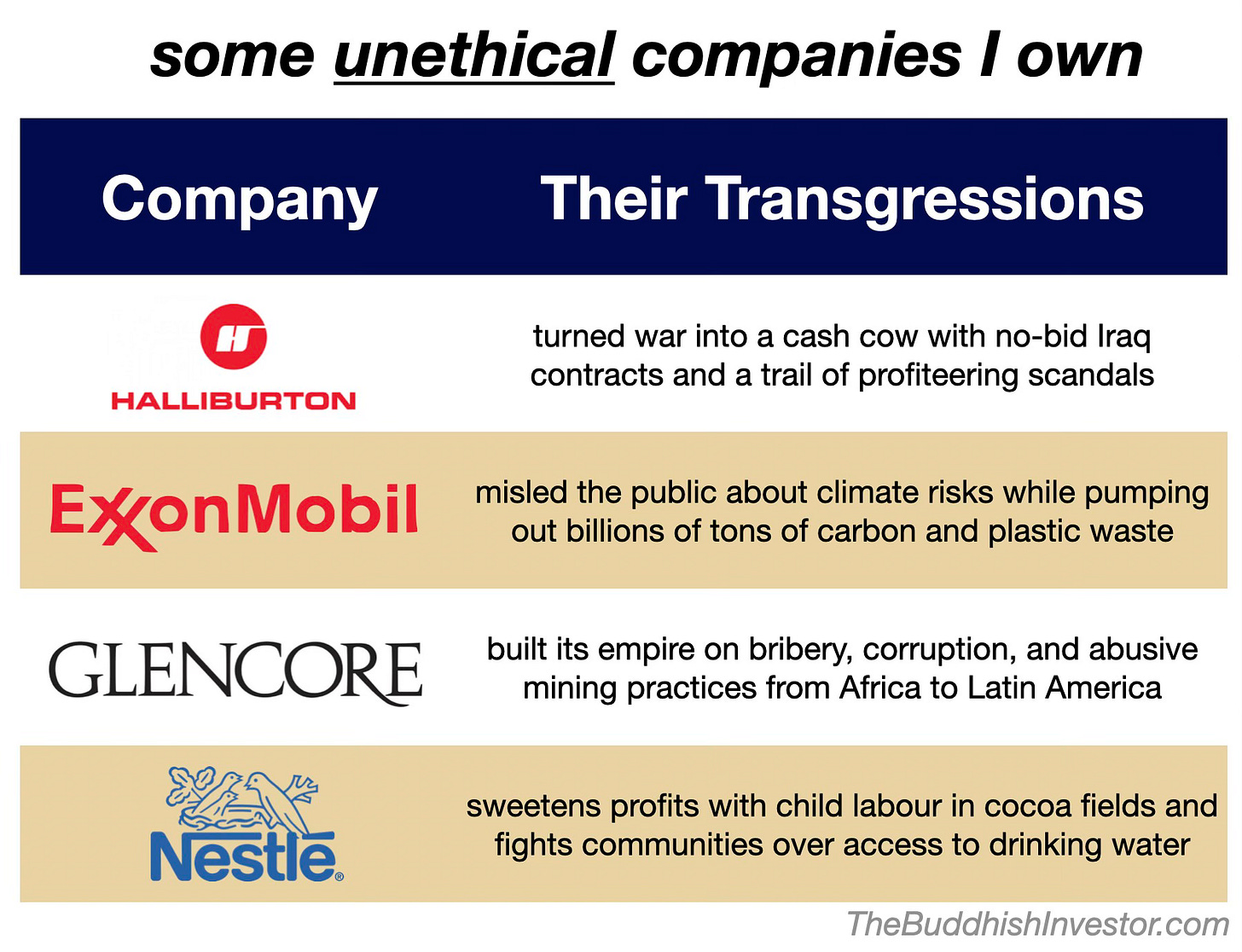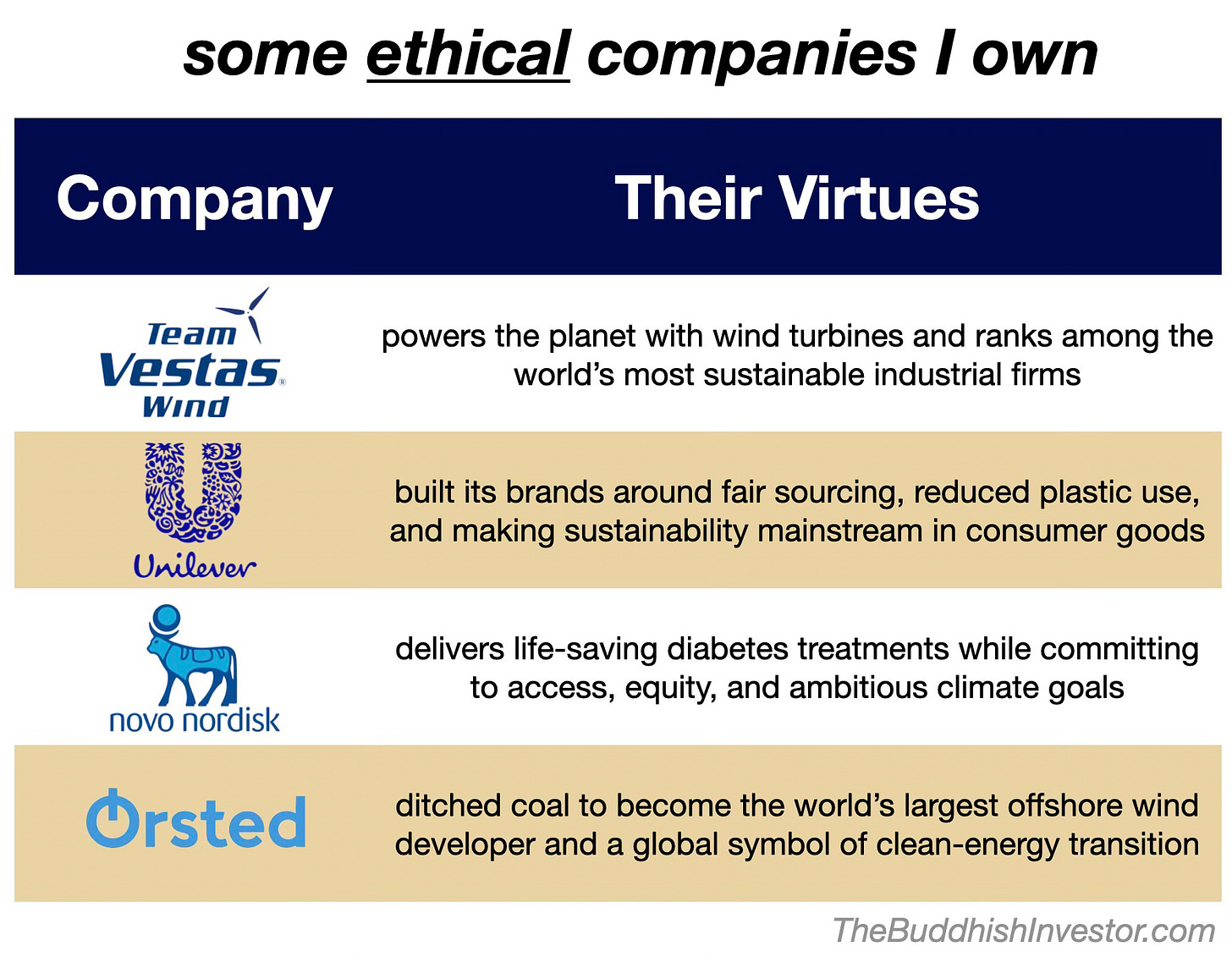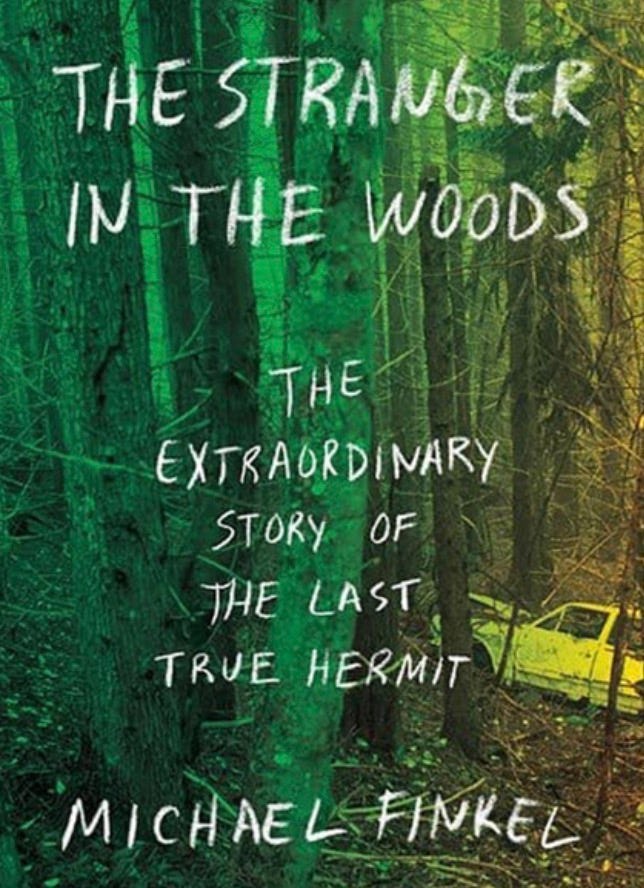Can You Be a Good Person With a Bad Portfolio?
Yes—if you're willing to do the work elsewhere
I own a bunch of companies with dubious track records for good behaviour1:
Why do I own companies tied to war, climate change denial, and even child labor?
In my defense, I also hold a bunch of virtuous companies:
So why don't I just ditch the bad ones and keep the good ones?
The Buddha certainly would’ve endorsed this based on his teachings in the Pali canon 2,600 years ago:
“there are these five trades that should not be practiced by a lay follower. Which five? Business in weapons, business in human beings, business in meat, business in intoxicants, and business in poison”
- Aṅguttara Nikāya 5.177, Vanijja Sutta
But it’s not so straightforward to ditch the baddies. All of these companies—good and bad—are bundled together in VGRO2, my primary portfolio holding.
The next question is obvious: couldn't I just sell VGRO and switch to a fund of only “good” companies?
Yes, I could. This is the whole premise of ESG investing.
ESG and why it falls short
ESG stands for Environmental, Social, and Governance—a trend that has gained momentum in recent years. Companies tout their virtues to appeal to socially minded and environmentally conscious investors. There are entire funds dedicated to this approach.
But ESG investing has some drawbacks. While it's supposed to measure how responsible or ethical companies are, it can fall short. ESG ratings can be inconsistent, sometimes rewarding companies for good disclosure paperwork rather than actual real-world impact3. Many ESG funds end up looking surprisingly similar to broad market funds, often holding some of the very same companies with questionable reputations4.
Perfection or bust?
ESG investing might be a step in the right direction, but it’s not perfect. Perhaps perfection—being absolutely ethical—can only be achieved by avoiding the stock market and capitalism altogether.
After all, capitalism is mired in human tragedy. It has driven incredible progress, yes—modern medicine, global connectivity, prosperity for billions. But at what cost? The same system that built hospitals also built sweatshops. The same markets that created wealth also created devastating inequality and environmental destruction.
We’re told to ‘take the good with the bad’ when it comes to capitalism. But when the bad includes child slavery, deforestation, and crushing inequality, how can we simply accept it?
It’s enough to drive a person to throw up their hands and go live in a cave.
But that just isn’t practical. We are all completely enmeshed in capitalism—through our purchases, jobs and investments. There’s no getting away from it.
We have to find a way to live in this world as imperfect as it is. This is the whole basis of Buddhism. It meets people where—and when—they are.
The Buddha’s world of 2,600 years ago also had its share of problems—constant warfare, inhumane justice systems, slavery, famine, gender inequality and more. He created a set of beliefs and practices that helped the people of that time navigate the world they lived in.
If there had been a stock market in India in 5th century BCE, something tells me that the Buddha would’ve been okay with people investing their money in it. So long as they did it with the intention of minimizing harm to others and using any wealth accumulated to improve the world and lives of those around them.
Passive investing, active good
I don’t like the fact that I’m actively supporting warmongers and climate change deniers in my portfolio.
But, for now, I’m going to keep VGRO.
Am I violating the Buddha’s prohibition on investing in weapons and harmful businesses? Technically, yes. But the Buddha wasn’t a hardliner—he encouraged people to take steps toward less harm rather than demanding perfection. This is my imperfect step.
I believe passive investing, even with its moral compromises, can be a vehicle for good when combined with intentional action.
Here’s my logic:
Time is a form of capital. Every hour I’d spend researching ESG funds, comparing holdings, and rebalancing toward ‘cleaner’ companies is an hour I’m not spending on direct impact5. I could use that time to volunteer at a community kitchen or do something to improve the world around me.
Wealth can be redirected. Passive investing consistently builds wealth over time. That wealth doesn’t have to stay locked in the market. It can fund a neighbor’s GoFundMe, support a local community aid organization, or help family members in need.
Perfect portfolios don’t exist. Even ‘ethical’ funds often hold questionable companies. And even if they didn’t, no publicly traded company operates in a capitalism-free bubble.
The Buddha gets it
The Buddha doesn’t demand perfection from us—or our portfolios. He understood deeply that we live in a messy world and that we can only do our best to navigate it as skillfully as possible. He encouraged people to take steps toward less harm, more kindness, and greater freedom.
I believe that our portfolios can hold troubling companies like ExxonMobil or Halliburton, and we can still choose to live in ways that tilt the balance toward good—through our actions, intentions, and generosity.
It’s not perfect, but maybe it’s good enough.
- The Buddh-ish Investor
Listen to The Buddh-ish Investor Podcast
Follow me on Bluesky: @buddhishinvestor.bsky.social
Reach out at Sangha@TheBuddhishInvestor.com or drop a comment below!
Take home points:
Investing is ethically messy. It’s hard to avoid companies with “bad” practices—even with approaches like ESG.
Imperfect doesn’t mean we can’t do good. Even if our portfolios or financial lives are ethically fraught, we can still leverage what they bring us (e.g., wealth, time) to do good in the world around us.
If you’re looking for more:
The Stranger in the Woods - a fascinating account of Christopher Knight, who renounced capitalism and the other trappings of modern society and lived in the woods of Maine for 27 years:
[1] Commonwealth v. Exxon Mobil Corp., Massachusetts Attorney General’s lawsuit alleging Exxon misled investors and consumers about climate risks. Climate Case Chart.
[2] CBS News. Halliburton Whistleblower on Exposing $7 Billion No-Bid Defense Contract. June 30, 2019. CBS News.
[3] Reuters. Glencore sentenced to pay $700 mln in U.S. after bribery guilty plea. February 28, 2023. Reuters.
[4] Reuters. Hershey, Nestlé, other cocoa companies defeat appeal of child slavery lawsuit. July 22, 2025. Reuters.
If you’re wondering, ExxonMobil, Nestle, Halliburton and Glencore together make up about 0.38% of VGRO.
Lowry, Michelle B., Pingle Wang, & Kelsey D. Wei. “Are All ESG Funds Created Equal? Only Some Funds Are Committed.” ECGI Finance Working Paper No. 874/2023, April 21, 2025 (original version circulated April 2022). SSRN Paper No. 4104700
Baker, Malcolm P., Mark L. Egan, & Suproteem K. Sarkar. How Do Investors Value ESG? NBER Working Paper No. 30708. National Bureau of Economic Research, December 2022 (revised December 2024). DOI: 10.3386/w30708
Interestingly, I find that I have more time to dedicate to this Substack (and the new podcast!) since streamlining my investment portfolio a few months back.





I will suggest that an initial investment of a couple of hours to create a "good-enough" ESG plan that focuses on simple index funds and can be consistently applied going forward without much more thought is something to consider. It's not perfect, but it is better, and I think the time-benefit ratio is positive.
Save a lot of time and research by simplifying to a 3-fund simple Boglehead index portfolio approach and then choosing the equivalent ESG index:
1. X% Total US Stock Market Index - example: move from Vanguard VTSAX fund to Vanguard ESGV ETF
2. X% Total International Stock Market Index - example: move from Vanguard VTIAX fund to Vanguard VSGX ETF
3. Y% Total US Bond Market Index - example: move from Vanguard VBTLX fund to iShares EAGG ETF
You are mostly subtracting extraction, combustion, military, guns, tobacco and leaning more heavily on healthcare and technology companies, but not in a hugely risky way - your annual variability will increase, but your long-term risk evens out and you're still into the same 80-90% of the market.
% recommendations:
Total stock %: 40% (in retirement & conservative) to 100% (decades from retirement and/or aggressive)
International stock % of Total stock %: 0% (only US) to 40% (Vanguard target fund lean)
Bonds %: 100% - Total stock %
Choose these when you have the option to do so, but you will likely need to make compromises:
* Selling from your non-retirement taxable accounts to buy these would trigger capital gains; instead, turn off dividend reinvestments and reinvest in these funds going forward and/or wait for a market correction to sell when down to tax loss harvest against capital gains and then reinvest;
* Your work retirement plan may only offer certain funds - invest in the regular index funds and don't worry about it (or if you have the energy, opt into "self-directed" options that some programs offer to choose these)
...these aren't the only funds, nor the most ESG active ones (that might have more stringent screens or have more shareholder activism), but they are low-cost, easy, low-risk and better than nothing.
I asked ChatGPT this question recently and it provided some other suggestions:
https://chatgpt.com/share/693d77dd-3230-8006-ab57-cf3af3ceca60